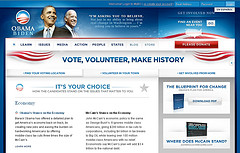How are British parties responding to the social media successes of Obama?

I’ve recently answered a few questions about political parties and their use of social media, sent to me by Vincent Bailey, a student at Cardiff University completing a masters degree in Political Communication. He is looking at the use of new media by the main three parties in the UK, with reference to the Obama campaign.
As it’s a topic of wider interest, I thought I’d share my answers to his questions more widely:
Firstly, it would be impossible to do a study of this kind without mentioning Obama after the success of his campaign last year. Do you think that the high profile nature of his social media campaigning has added legitimacy to these methods over here?
Yes: hugely so. The glamour and scale of Presidential election campaigns, real and fictional (as in The West Wing), grabs the attention of politicians in Britain in the way that events in our own country often do not. More generally, British culture and British politics are hugely influenced by America, with the default view usually being that whatever is happening over there is bigger, better and coming our way.
That’s true to varying degrees, and in the political sphere the major differences in our political systems are usually overlooked. But regardless of that, the eagerness of the British political party establishments to look to the US means that debates in all the main parties have been dominated by people saying in one form or another, “We must copy Obama”. Regardless of the underlying validity of such claims, if enough people say that it ends up becoming a self-fulfilling prophecy.
The internet has been heralded by new media optimists for its potential to enhance the democratic process. Given its inherent interactivity, do you think more could be done by parties to encourage this?
The internet has already transformed politics, but in quiet, behind-the-scenes ways. Email, for example, is now an essential tool for organising and communicating. Take down email and mobile phone networks for a day and many people would be struggling to know how to continue doing their jobs.
Interactivity is a different question, and many people who tout it as the future – and condemn political parties who don’t embrace it more – don’t really understand politics.
First, political parties should have clear beliefs and present them to the public to choose between. You can’t combine that with opening up your policies to idealistic interactive decision making, because that means you no longer have beliefs other than the majority of the public is right. That’s not a future to welcome. What you can do is use the internet in more subtle ways to refine priorities and improve on details, but fundamentally – ceding control over what you believe to any passing majority would mean all parties have the same views, all the time. The appeal of that would weaken very quickly I think!
Second, interactivity at the level of the individual politician runs very quickly into problems of scale. A typical MP has around 80,000 constituents. If they work a 60 hour week, every week and doing no other work, that would still give them only around two and a half minutes per person per year. That’s not going to get much of an interactive dialogue really going.
Simply broadcasting one-way isn’t the answer, but it means much more subtlety needs to be deployed than crude exhortations for politicians to have more interactive relations with their constituents.
What role do you expect social networking platforms to play, in terms of campaigning, at the next general election? How much of an impact will they have on online strategy?
Social networking has grown very quickly in the last few years and there has been a huge shift in people’s online time towards spending it on social networks. Twitter, Facebook, even YouTube – the stalwarts of the social media world were barely present, if at all, at the time of the last general election. Now they have a huge presence in people’s online activities. So I think they must feature very heavily.
Fundamentally political parties and campaigners have to go to where the public are; politics doesn’t have enough attraction for parties to be able to expect the public to come to them. That increasingly means going to social networks.
For online communication methods to fulfil their potential, how important is it for them to be incorporated into an integrated on and offline communications strategy?
It’s very important. One simple example: often the most effective way to gather email addresses from voters is to ask them face-to-face or in leaflets pushed through the letterbox. In the end, the voter is making one decision on their ballot paper, so you have to make the different routes to influencing that decision work together and supplement each other.
Hi Mark,
Interesting post. I think the next election will be an interesting test, it will also be interesting to see if any of the parties approach Blue State Digital (billed as “Obama’s digital agency) who now have a base in the UK.
Certainly on the monitoring side we worked with UKIP in the run up to the European Elections with some success. – Drop me a line if your interested in discussing further.
Tom